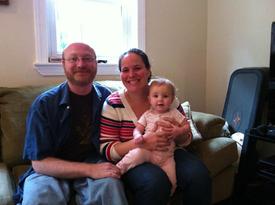target heart rate question

mamagooskie
Posts: 2,964 Member
How can I tell what my ideal target HR is? I just bought a HRM and I want to make sure I'm doing my workouts in my ideal range.
Thanks!
Thanks!
0
Replies
-
I found this via google search:
http://missourifamilies.org/quick/nutritionqa/fitqa14.htm
How can I determine my Target Heart Rate Zone?
First find your maximum heart rate (MHR) by subtracting your age from 220
Next multiple (MHR) by 0.60 = lower end of the target heart rate zone
Next multiply (MHR) by 0.90 = upper end of the target heart rate zone
These two numbers represent your target heart rate zone. You should strive to stay between these numbers during your workout.
An example calculation for a 30-year-old woman is below:
220 - 30 = 190 = MHR
190 x 0.60 = 114 beats per minute
190 x 0.90 = 171 beats per minute
Target heart rate zone = 114 to 171 beats per minute0 -
I found this via google search:
http://missourifamilies.org/quick/nutritionqa/fitqa14.htm
How can I determine my Target Heart Rate Zone?
First find your maximum heart rate (MHR) by subtracting your age from 220
Next multiple (MHR) by 0.60 = lower end of the target heart rate zone
Next multiply (MHR) by 0.90 = upper end of the target heart rate zone
These two numbers represent your target heart rate zone. You should strive to stay between these numbers during your workout.
An example calculation for a 30-year-old woman is below:
220 - 30 = 190 = MHR
190 x 0.60 = 114 beats per minute
190 x 0.90 = 171 beats per minute
Target heart rate zone = 114 to 171 beats per minute0 -
There is also a most effective heart rate for you to burn fat calories. Using the same beginning part of that formula (220 - your age) multiple that by 65% and 75%. You want to stay in that range to burn FAT. Above 75% you are anaerobic and burning lean muscle mass - which we don't want to do.0
-
Your heart rate monitor should have a percentage on the screen when you take your heart rate.......You should be between 65% - 75%. It is based on this.
220 minius age devided then you take that number it is the denomiator and your actual Heart rate is the numerator.
that is the basic principal but your HRM should do all that for you0 -
Your watch will calculate it for you based on your age. You only need to set your maximum heart rate.0
-
There is also a most effective heart rate for you to burn fat calories. Using the same beginning part of that formula (220 - your age) multiple that by 65% and 75%. You want to stay in that range to burn FAT. Above 75% you are anaerobic and burning lean muscle mass - which we don't want to do.
according to this calculation I pretty much can't work out then since my top HR would be 141 and If I walk at a 3.5 speed while pumping my arms I can easily get my heart rate to 145. or when I am jogging my heart rate can get in the 170's.
so how am I ever ever ever going to be able actually run a 5k or 10k or marathon if I can't allow my HR to get above 141?
OH and I wanted to say when my HRM says I am in the 140s-150s I can still talk and I don't breathe that hard at all.0 -
I have the exact same issues mama.0
-
What he has posted is referring to burning fat or a fat burn zone, however you want to call it. What it means is that you are burning a higher proportion of fat than when you are doing cardio or are at the cardio zone which is 85% or so of your heart rate. You still burn fat while doing cardio at that level as well.
For example:
65% of your HR at 30 minutes on a treadmill/elliptical: Say you burn 200 calories if you are lucky. Even if the portion of calories you are burning is say 70% you have only burned 140cal worth of fat.
85% of your HR at 30 minutes on a treadmill/elliptical: Say you burn 400 calories. Lets say the portion of calories you are burning is fat is 50%, you have burned 200cal worth of fat.
It's a simplification of course but that is the gist of the way the heart rate zones work. Those estimates are very generous on the diffence but the simple fact is: You burn more fat doing higher intensity exercises in the same amount of time as lower intensity excecises.
The fat burning zone is for example very useful for a bodybuilder who is trying to preserve every ounce of muscle while cutting to low levels of body fat. The average person or people trying to lose weight in general, the cardio level is much more beneficial.0 -
Vipecap thanks for the info......I mean I am barely breaking a sweat at 141 HR so for me the 150s-180's makes me feel like I am actually working out. I don't have any plans on becoming a body builder......I just want to lose 99 more lbs and tone up.
So I guess I can go workout now and not worry about keeping my HR so low.
thanks again.0 -
I'm just a simple kind of guy. I know I don't want to lose the muscle mass I have so I try to keep my heart rate optimized for burning fat. I have noticed that the more I exercise the harder it is to achieve the targeted heart rate without increasing the intensity of the exercise. I always assumed this was due to increasing cardio health / strength? In the end it's all about your health, feeling good and being happy with what you see in the mirror.
For what it's worth... if I workout and stay in my targeted heart rate to burn fat, I don't usually feel like I'm REALLY exercising. It's almost like warming up instead. Today I was on the elliptical though and just doing my usual was kicking my butt. I attribute this to all the extra - but unnoticed - exercise I got yesterday at the pool and the fact that I gave blood this week.0
This discussion has been closed.
Categories
- All Categories
- 1.4M Health, Wellness and Goals
- 394.2K Introduce Yourself
- 43.9K Getting Started
- 260.4K Health and Weight Loss
- 176.1K Food and Nutrition
- 47.5K Recipes
- 232.6K Fitness and Exercise
- 437 Sleep, Mindfulness and Overall Wellness
- 6.5K Goal: Maintaining Weight
- 8.6K Goal: Gaining Weight and Body Building
- 153.1K Motivation and Support
- 8.1K Challenges
- 1.3K Debate Club
- 96.4K Chit-Chat
- 2.5K Fun and Games
- 3.9K MyFitnessPal Information
- 15 News and Announcements
- 1.2K Feature Suggestions and Ideas
- 2.7K MyFitnessPal Tech Support Questions





